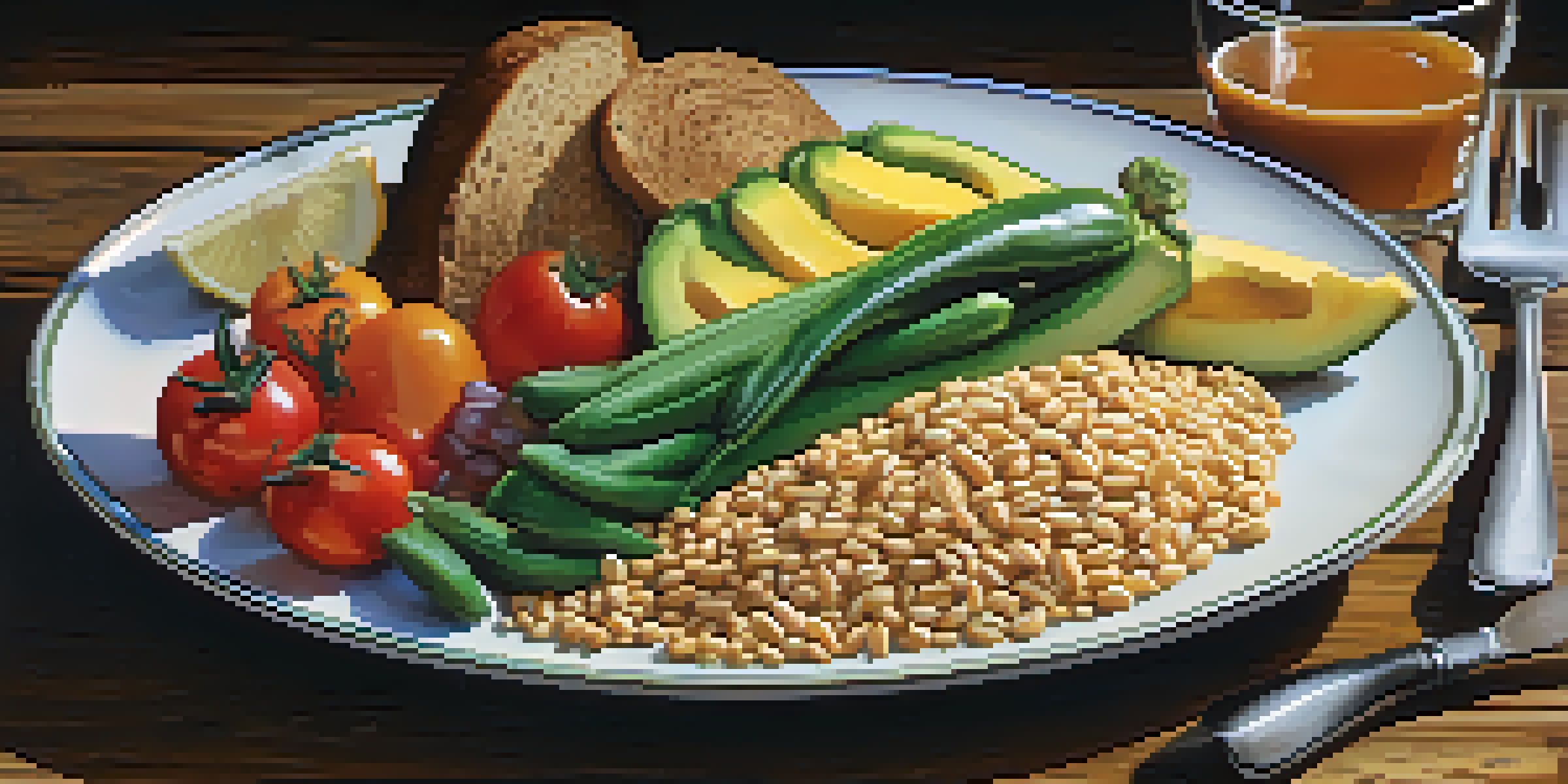Understanding Nutrition: The Foundation of Healthy Eating

What is Nutrition and Why Does It Matter?
Nutrition is the science that studies how food impacts our health. It goes beyond just eating; it encompasses understanding how our bodies use the nutrients from food. Proper nutrition is crucial for maintaining energy levels, supporting growth, and preventing diseases.
The greatest wealth is health.
Think of nutrition as the foundation of a house—without a solid base, everything else is at risk. When we nourish our bodies with the right foods, we build a robust system that can fight off illness and promote longevity. Ignoring nutrition can lead to a variety of health issues, just like a weak foundation can lead to a crumbling structure.
Ultimately, understanding nutrition empowers us to make informed choices about what we eat. It helps us recognize the importance of a balanced diet and motivates us to prioritize our health, which can lead to improved quality of life.
The Key Nutrients for a Balanced Diet
A balanced diet consists of five key nutrients: carbohydrates, proteins, fats, vitamins, and minerals. Each plays a unique role in our bodies; for instance, carbohydrates provide energy, while proteins are vital for growth and repair. Fats, often misunderstood, are essential for hormone production and nutrient absorption.

Vitamins and minerals are like the tiny gears in a watch—small but crucial for keeping everything running smoothly. They help our bodies function properly and can be found in various foods like fruits, vegetables, grains, and dairy. Ensuring we get a mix of these nutrients can help us achieve optimal health.
Nutrition is Essential for Health
Understanding nutrition helps us make informed choices that can enhance our energy, growth, and overall well-being.
By understanding these key nutrients, we can make smarter food choices. For example, opting for whole grains instead of refined options can enhance our energy levels, while incorporating more fruits and vegetables can boost our immune system.
Understanding Macronutrients and Micronutrients
Macronutrients are the nutrients we need in larger amounts, including carbohydrates, proteins, and fats. They provide the energy and building blocks our bodies require to function. In contrast, micronutrients—like vitamins and minerals—are needed in smaller quantities but are equally essential for health.
Let food be thy medicine and medicine be thy food.
A simple analogy is thinking of macronutrients as the fuel for a car, while micronutrients are the oil that keeps the engine running smoothly. Without enough fuel, the car won't move, but without oil, the engine can seize up. Both types of nutrients are necessary for a well-functioning body.
Balancing macronutrients and micronutrients in our diet can significantly impact our overall health. For instance, a diet rich in macronutrients without sufficient micronutrients can lead to deficiencies and health issues.
The Role of Hydration in Nutrition
Hydration is often overlooked but is a crucial aspect of nutrition. Water plays a vital role in digestion, nutrient absorption, and temperature regulation. Staying adequately hydrated can enhance energy levels and improve physical performance.
Think of your body as a garden; just as plants need water to thrive, our bodies require ample hydration to function optimally. Dehydration can lead to fatigue, headaches, and even confusion, much like a wilting plant.
Macronutrients vs. Micronutrients
Both macronutrients and micronutrients play vital roles in maintaining our health, with macronutrients providing energy and micronutrients supporting essential bodily functions.
To maintain proper hydration, aim to drink plenty of water throughout the day and include moisture-rich foods in your diet, such as fruits and vegetables. Understanding the connection between hydration and nutrition can help us feel our best.
How to Read Nutrition Labels Effectively
Nutrition labels can be a valuable tool for making informed food choices, but they can often be confusing. Key components to look for include serving size, calories, and nutrient breakdowns. Understanding these elements can help you compare products and select healthier options.
Imagine walking into a grocery store with a treasure map; nutrition labels are your guide to discovering what’s truly beneficial for your body. For example, a product may seem healthy at first glance, but a quick look at the sugar content can reveal otherwise.
By learning to read nutrition labels effectively, you empower yourself to make better decisions. This skill can lead to improved eating habits and a more balanced diet overall.
The Importance of Portion Control
Portion control is another critical aspect of healthy eating that often gets overlooked. It refers to the amount of food we choose to eat at one time, and managing portions can help prevent overeating. Understanding appropriate portion sizes can be the key to maintaining a healthy weight.
Think of portion control as a balancing act; too much on one side can tip the scale towards weight gain, while too little can leave you feeling unsatisfied. Using smaller plates or measuring servings can help you stay on track without feeling deprived.
Hydration Supports Physical Performance
Staying hydrated is crucial for digestion, nutrient absorption, and maintaining energy levels, similar to how water sustains a thriving garden.
By practicing portion control, you can enjoy a variety of foods while still achieving your health goals. It encourages mindfulness in eating and can lead to a more enjoyable and fulfilling experience.
Creating a Sustainable Healthy Eating Plan
Building a healthy eating plan requires more than just knowledge of nutrition; it also involves creating habits that are sustainable over time. Start by incorporating a variety of foods into your diet, focusing on whole, unprocessed options. This approach can help ensure you get all the nutrients your body needs.
Consider your eating habits like planting a garden; it requires planning, patience, and care. Gradually introduce new foods and recipes to prevent feeling overwhelmed. Remember, it’s about progress, not perfection.

Additionally, seek support from friends or family to make the journey more enjoyable. By creating a sustainable eating plan, you’re not just setting yourself up for short-term success but also fostering a lifelong commitment to health and well-being.